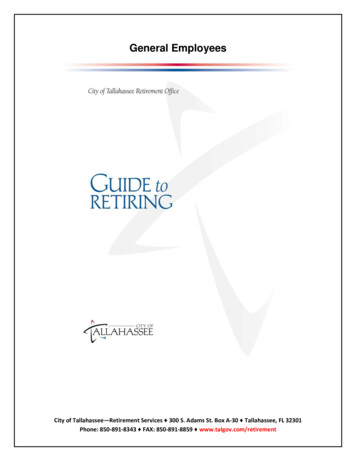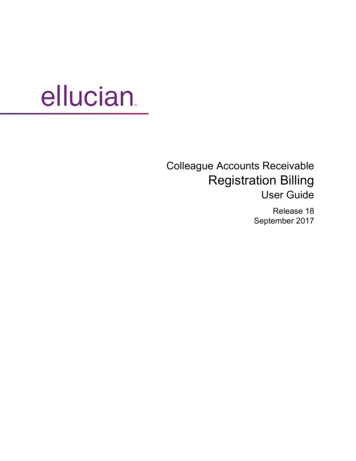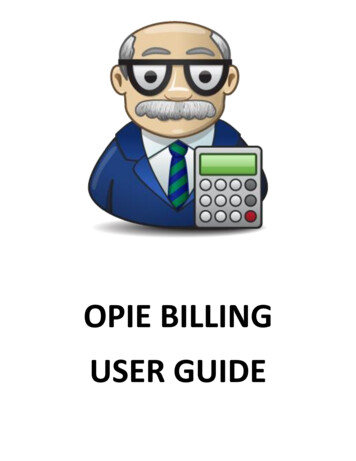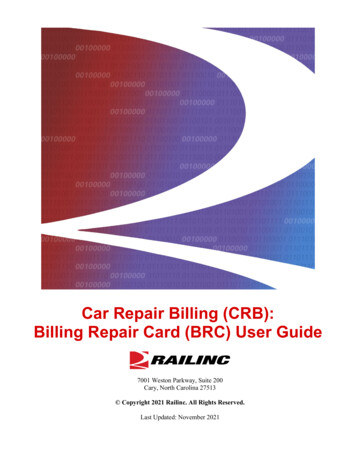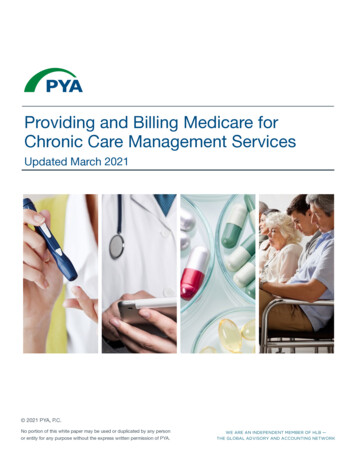
Transcription
Providing and Billing Medicare forChronic Care Management ServicesUpdated March 2021 2021 PYA, P.C.No portion of this white paper may be used or duplicated by any personor entity for any purpose without the express written permission of PYA.WE ARE AN INDEPENDENT MEMBER OF HLB —THE GLOBAL ADVISORY AND ACCOUNTING NETWORK
March 2021 UpdateMedicare began reimbursing physicians for chronic care management (CCM) services in January 2015 underCPT 994901 in response to anecdotal evidence that care management services reduce the total costs of careand improve patient outcomes.In November 2017, the Centers for Medicare & Medicaid Services’ (CMS) evaluation contractor, Mathematica,published its analysis2 of CCM’s impact on Medicare spending from 2014 to 2016. The results are impressive:per-beneficiary-per-month (PBPM) expenditures decreased by 74 for CCM beneficiaries after 18 months.Most of these savings were realized in inpatient and post-acute care, while Medicare payments to physiciansactually increased.Estimated PBPM impact of CCM on total expenditures and by expenditure category:follow-up periods of 6,12, and 18 alEquipmentOutpatientServicesProfessionalServices 31 23 15 17 16 14 1 1 0 0 0- 2 18TotalMedicareExpenditure- 2- 8- 14- 21- 18- 22- 21- 27- 44- 286-month follow-up period12-month follow-up period18-month follow-up period- 74Source: Medicare 2014-2016 enrollment and fee-for-service claims data. Please see the original report for thestatistical methods and significance related to the results shown in this graph.31Current Procedural Terminology (CPT) is a registered trademark of the American Medical Association.2Schurrer, J. et al. Evaluation of the Diffusion and Impact of the Chronic Care Management (CCM) Services: Final Report. November 2, 2017. Mathematica PolicyResearch.3Ibid.2 Providing and Billing Medicare for Chronic Care Management Services 2021 PYA, P.C.
These results make a compelling case for CCM for providersengaged in shared savings arrangements and those otherwisepreparing for a post-fee-for-service world. As CMS notedin the 2020 Medicare Physician Fee Schedule Final Rule,CCM is “increasing patient and practitioner satisfaction,saving costs, and enabling solo practitioners to remain inindependent practice.”4When CCM was introduced in 2015, around 8,000 physiciansand non-physician practitioners billed approximately 1 millionCCM services (CPT 99490) for about 320,000 Medicarebeneficiaries. By 2018 (the most recent year for whichMedicare utilization data is available), those numbers hadgrown to 22,500 physicians and non-physician practitioners,4 million CCM services, and 1 million Medicare beneficiaries.5Despite this, CCM remains underutilized. Although twothirds of traditional Medicare beneficiaries—about 35 millionindividuals—suffer from multiple chronic conditions, less than10% have received these services.6Since 2015, CMS has made multiple revisions to the CCMbilling rules and expanded coverage for related services,all for the purpose of increasing beneficiary access to caremanagement services. Also, CMS has published extensiveguidance on providing and billing for these services. In fact,the agency maintains a website devoted exclusively toCCM resources.7To help providers understand the rules for billing caremanagement services, we have condensed the regulationsand related agency guidance (i.e., webinar presentations,FAQs, and Medicare Learning Network fact sheets) into thefollowing summary.484 Fed. Reg. 62,698 (Nov. 15, er.6See 84 Fed. Reg. 40,549 (Aug. 14, nt.Providing and Billing Medicare for Chronic Care Management Services 3 2021 PYA, P.C.
Chronic Care Management (CPT 99490, 99439, and 99491)Potential RevenueWhat is the Medicarereimbursement for CCM?As of January 1, 2021, the national payment rates for the three CCM codesare as follows:Non-FacilityFacilityCPT 99490 41.17 31.75CPT 99439 37.69 28.26CPT 99491 82.35 82.35CPT 99490 is the primary CCM code; the differences between this code andCPT 99491 and CPT 99439 are outlined in a later section.Does CCM qualify as apreventive service exemptfrom beneficiary cost sharing?No. CMS determined it does not have the statutory authority to exemptCCM from cost-sharing requirements. A beneficiary will be responsible forany co-payments or deductible amounts. If a beneficiary has a MedicareSupplemental Insurance (Medigap) policy, these amounts will be covered inthe same manner as co-payments and deductibles for regular office visitsand other Part B services.While no exceptions exist today, the impact of beneficiary cost sharing onCCM utilization is on the radar. In late 2019, the Office of Inspector General(OIG) published proposed changes to the Anti-Kickback Statute and CivilMonetary Penalties Law.8 As part of this proposed rule, the OIG soughtpublic comment regarding a limited waiver of beneficiary cost-sharingrequirements for CCM and other care management services.8Will Medicare Advantage (MA)plans reimburse for CCM?Commercial payers?An MA plan must offer its enrollees at least traditional Medicare benefits,which now will include CCM. Many MA plans are paying for CCM in thesame manner as they now pay for other physician services. Some MAplans, however, are not paying for CCM, claiming the plan itself is providingcare management services directly to beneficiaries.Are there other financialbenefits associated withdeveloping a CCM program?Besides direct revenue, CCM offers practitioners a bridge over the chasmbetween fee-for-service and value-based reimbursement. By developingand implementing a CCM program, a practitioner will grow skill sets andinternal processes critical to population health management, all the whilereceiving fee-for-service payment to support those rbors-under-the.4 Providing and Billing Medicare for Chronic Care Management Services 2021 PYA, P.C.
Eligible PractitionersWhich practitioners areeligible to bill Medicarefor CCM?Physicians (regardless of specialty), advanced practice registered nurses,physician assistants, clinical nurse specialists, certified nurse-midwives, orthe provider to which such individual has reassigned his/her billing rightsare eligible to bill Medicare for CCM. Other non-physician practitioners andlimited-license practitioners (e.g., clinical psychologists, social workers) andproviders not eligible for reimbursement under the Medicare Physician FeeSchedule (e.g., pharmacists) cannot bill for CCM.Can more than onepractitioner bill for CCM forthe same beneficiary for thesame calendar month?No. CMS will pay only one claim for CCM per beneficiary per calendarmonth. CMS has not stated how competing claims will be resolved, butpresumably the practitioner with the most recent valid written consent willreceive payment.Must a practice be recognizedas a patient-centered medicalhome (PCMH) to provide CCM?At one point, CMS proposed PCMH recognition as a condition to provideCCM, but the agency did not finalize that proposal. Instead, CMS requiresa practice to have five specific capabilities to bill for CCM. Each of thesecapabilities is covered in detail later.Are there specific servicesthe billing practitioner mustfurnish to a beneficiary as aprerequisite to providing CCMfor that beneficiary?If the billing practitioner has not seen the beneficiary in the last 12 months(or if the beneficiary is a new patient), the practitioner must discuss CCMwith the beneficiary as part of a face-to-face visit (e.g., regular office visit,annual wellness visit [AWV], or initial preventive physical exam [IPPE]),prior to billing for CCM for that beneficiary. The face-to-face visit is not acomponent of the CCM service, and thus may be billed separately.An initiating visit is not required for the practitioner to begin billing for CCMservices as long as he or she: (1) has beneficiary consent, and (2) has seenthe patient within the last 12 months.Are there services for whichthe same practitioner cannotbill for the same beneficiaryduring the same calendarmonth as CCM?The same practitioner cannot bill Medicare for CCM and any of the followingfour services for the same beneficiary in the same calendar month (with oneexception noted below): (1) transitional care management (TCM) (CPT 99495and 99496), (2) home healthcare supervision (HCPCS G0181), (3) hospicecare supervision (HCPCS G0182), and (4) certain end-stage renal disease(ESRD) services (CPT 90951-90970).In the case of TCM, that service and CCM may be billed by the samepractitioner in the same calendar month for the same beneficiary if the 30day post-discharge service period for TCM concludes before the end ofthat calendar month, and at least 20 minutes of CCM services are furnishedbetween that time and the end of that month.Providing and Billing Medicare for Chronic Care Management Services 5 2021 PYA, P.C.
Eligible Practitioners continuedIs CCM recognized as a ruralhealth clinic (RHC) serviceand/or a federally qualifiedhealth center (FQHC) service?Yes, but the RHC or FQHC will not receive its all-inclusive rate for CCM.Instead, the RHC or FQHC will be paid under a separate care managementcode specifically for RHCs and FQHCs, as explained later.Can Medicare Shared SavingsProgram (MSSP) participantsbill for CCM?Physician practices participating in CMS’ Comprehensive Primary CarePlus (CPC ) program cannot bill CCM for their attributed beneficiaries.Otherwise, participation in other CMS initiatives—including the MSSP—does not disqualify a practitioner from billing CCM for any beneficiary. AllCCM payments will be included in CMS’ calculations of total costs of carefor purposes of shared savings and bundled payment programs.Eligible BeneficiariesWho is an eligible beneficiary?A beneficiary is eligible to receive CCM if he or she has been diagnosedwith two or more chronic conditions, expected to persist at least 12 months(or until death), that place the individual at significant risk of death, acuteexacerbation/decompensation, or functional decline.CMS has not provided a definition or definitive list of “chronic conditions”for purposes of CCM. Nor has the agency offered guidance for determiningor documenting the specified acuity level. However, CMS has stated itintends for CCM services to be broadly available.Is there a reliable list ofchronic conditions?CMS maintains a Chronic Condition Warehouse (CCW), which organizesdata for approximately 60 specified chronic conditions and potentiallydisabling conditions. However, the CCW list is not an exclusive list ofchronic conditions. CMS may recognize other conditions for purposes ofproviding CCM.6 Providing and Billing Medicare for Chronic Care Management Services 2021 PYA, P.C.
Beneficiary ConsentWhat type of consent isrequired?Before January 1, 2017, a practitioner could not bill for CCM unless, anduntil, the beneficiary had signed a written consent form. Now, a signedconsent form is no longer required as a condition of payment. Instead,the practitioner must inform the beneficiary: (1) of the availability of CCMservices, (2) that only one physician can furnish and be paid for CCM duringa calendar month, and (3) that the beneficiary has the right to stop CCMservices at any time, effective at the end of the calendar month.The practitioner must document in the beneficiary’s medical record thatthe required information was provided and that the beneficiary explicitlyaccepted the services.When and how must theconsent be obtained from thebeneficiary?A practitioner should follow his or her practice’s existing policies andprocedures for obtaining consent for treatment. If the beneficiary isnot competent to give his or her consent to receive CCM, the requiredinformation should be provided to an individual with legal authority underapplicable state law to consent to treatment on behalf of the beneficiary.What happens if a beneficiaryrevokes his or her consent?If a beneficiary revokes his or her consent to receive CCM from a specificpractitioner, that practitioner cannot bill for CCM after the then-currentcalendar month. The practitioner may bill for CCM for the month in whichthe revocation is made, if the practitioner has furnished the minimumnumber of minutes of non-face-to-face care management services for thebeneficiary.How does a beneficiary revokeconsent?CMS does not specify the manner in which a beneficiary must revokeconsent. Presumably, if a beneficiary gives written or verbal consent to asecond practitioner to furnish CCM, that action will revoke the consentgiven to the first practitioner. However, this can create confusion (and billingissues) if the first practitioner is unaware of the consent given to the secondpractitioner. CMS will make payment on the first claim it receives and denya claim subsequently received from another provider. It would be up to thisprovider to appeal the denial and raise the issue of beneficiary consent.Providing and Billing Medicare for Chronic Care Management Services 7 2021 PYA, P.C.
Five Specified CapabilitiesWhat are the five specifiedcapabilities a practitionermust possess to bill for CCM?The five specified capabilities include: (1) using a certified electronic healthrecord (EHR) for specified purposes, (2) maintaining an electronic care plan,(3) ensuring beneficiary access to care, (4) facilitating transitions of care,and (5) coordinating care.When a practitioner submits a claim for CCM, the practitioner is, in effect,attesting to possessing each of these capabilities for providing CCM. Eachis addressed in the following sections.For what purposes must apractitioner use a certifiedEHR in furnishing CCM(1st capability)?A practitioner is not required to be a meaningful user of a certified EHRtechnology, but is required to use “CCM certified technology” to meet thefollowing core technology capabilities:1.Structured recording of demographics, problems, medications, andmedication allergies, all consistent with 45 CFR 170.314(a) (3)-(7)2.Creation of summary care record consistent with 45 CFR170.314(e)(2)The practitioner must be able to transmit the summary care recordelectronically for purposes of care coordination. CMS does not specifyacceptable methods of transmission.Additionally, the following must be documented in the beneficiary’smedical record, but effective January 1, 2017, the regulations no longerrequire the use of a qualifying certified EHR to record this information:1.Beneficiary consent2.Communication to, and from, home- and community-basedpractitioners regarding beneficiary’s psychosocial needs andfunctional deficits (care coordination)8 Providing and Billing Medicare for Chronic Care Management Services 2021 PYA, P.C.
Five Specified Capabilities continuedWhat is the requirement foran electronic care plan(2nd capability)?The practitioner must develop and regularly update (at least annually)an electronic patient-centered care plan based on a physical, mental,cognitive, psychosocial, functional, and environmental (re)assessment of thebeneficiary’s needs.The plan should include a list of current practitioners and suppliers whoare regularly involved in providing medical care to the beneficiary, theassessment of the beneficiary’s functional status related to chronic healthconditions, the assessment of whether the beneficiary suffers from anycognitive limitations or mental health conditions that could impair selfmanagement, and an assessment of the beneficiary’s preventive healthcareneeds.The plan should address all health issues (not just chronic conditions) andbe congruent with the beneficiary’s choices and values.What items are typicallyincluded in a care plan?Does the care plan haveto be created, maintained,and updated using acertified EHR?According to CMS, a care plan should include the following: A problem list, expected outcome and prognosis, and measurabletreatment goals Symptom management and planned interventions (including allrecommended preventive care services) Interaction and coordination with outside resources andpractitioners and providers Medication management (including a list of current medicationsand allergies, reconciliation with review of adherence and potentialinteractions, and oversight of patient self-management) Responsible individual for each intervention Requirements for periodic review/revisionCMS requires a practitioner to “use some form of electronic technologytool or services in fulfilling the care plan element,” but acknowledges that“certified EHR technology is limited in its ability to support electronic careplanning at this time.” Accordingly, practitioners “must have flexibility to usea wide range of tools and services beyond EHR technology now available inthe market to support electronic care planning.”Providing and Billing Medicare for Chronic Care Management Services 9 2021 PYA, P.C.
Five Specified Capabilities continuedWho must have access to theelectronic care plan?What is required with respectto beneficiary access to care(3rd capability)?What is required with respectto transitions of care(4th capability)?What is required with respectto coordination of care(5th capability)?The regulations impose two requirements with respect to access to thebeneficiary’s care plan:1.The practitioner should timely share the care plan electronically(including by facsimile transmission) with individuals involved in thebeneficiary’s care, both within and outside the billing practice.2.The practitioner must provide a copy of the care plan to thebeneficiary and/or caregiver in a format consistent with patient/caregiver preference (e.g., hard copy, electronic, or verbal).A practitioner furnishing CCM must:1.Provide a means for the beneficiary to access a member of thecare team (who qualifies as a “member of the care team” isexplained in a later section) on a 24/7 basis to address acute/urgent needs in a timely manner.2.Ensure the beneficiary can receive successive routine appointmentswith a designated practitioner or member of the care team.3.Provide enhanced opportunities for beneficiary-provider (orcaregiver-provider) communication by telephone and asynchronousconsultation methods (e.g., secure messaging).A practitioner must have the capability to do the following:1.Follow up with the beneficiary after an ER visit.2.Provide post-discharge TCM services as necessary (although thepractitioner cannot bill for TCM and CCM during the same month).3.Coordinate referrals to other clinicians.4.Create and exchange timely continuity-of-care documents withother practitioners and providers (see previous information onsummary care record and electronic care plan).The practitioner must have the capability to coordinate with home- andcommunity-based clinical service providers (including providers of homehealth and hospice, outpatient therapies, durable medical equipment,transportation services, and nutrition services) to meet the beneficiary’spsychosocial needs and functional deficits.The practitioner’s communication with these service providers must bedocumented in the beneficiary’s medical record.10 Providing and Billing Medicare for Chronic Care Management Services 2021 PYA, P.C.
20 Minutes of Care Management ServicesWhat level of service must befurnished to bill for CCM?At least 20 minutes of care management services must be performed ona beneficiary’s behalf during a calendar month for a practitioner to bill forCCM for that month.Before January 1, 2020, a practitioner would receive the samereimbursement regardless of whether 20 or 40 minutes of care managementservices were provided in a given month. Effective January 1, 2020, apractitioner can bill CPT 99490 for the first 20 minutes of clinical staff timespent performing CCM activities in a given calendar month and can bill CPT99439 for the second and third 20-minute increments.What types of servicesconstitute care managementservices?In the context of CCM, CMS identifies the following services performed ona beneficiary’s behalf as counting toward the 20-minute time requirement:(1) performing medication reconciliation and overseeing the beneficiary’sself-management of medications, (2) ensuring receipt of all recommendedpreventive services, and (3) monitoring the beneficiary’s condition (physical,mental, and social).This list, however, is not exclusive; other types of services may counttoward the 20-minute requirement. In the context of TCM, for example,CMS identified the following additional services as non-face-to-face caremanagement services: (1) providing education and addressing questionsfrom the patient, family, guardian, and/or caregiver; (2) identifying andarranging for needed community resources; and (3) communicating withhome health agencies and other community service providers utilized bythe beneficiary.According to CMS, CCM involves activities not typically or ordinarilyfurnished face-to-face. If these activities occasionally are provided byclinical staff face-to-face with a beneficiary, the time may be counted towardthe 20-minute minimum requirement.Providing and Billing Medicare for Chronic Care Management Services 11 2021 PYA, P.C.
20 Minutes of Care Management Services continuedWho may perform caremanagement services?CMS anticipates “clinical staff will provide CCM services incident to theservices of the billing physician” or non-physician practitioner. However, ifthe billing practitioner provides some services directly, his or her time alsomay count toward the 20-minute minimum, assuming those services are notcontent of another service billed by the practitioner.The agency references the CPT definition of “clinical staff:” “a person whoworks under the supervision of a physician or other qualified healthcareprofessional and who is allowed by law, regulation, and facility policy toperform or assist in the performance of a specified professional service, butwho does not individually report that professional service.”CMS clarifies that “time spent by clinical staff may only be counted ifMedicare’s ‘incident to’ rules are met, such as supervision, applicable statelaw, licensure and scope of practice.” It is the responsibility of the billingpractitioner to determine if a clinical staff member is competent and capableof performing a specific service under appropriate supervision. CMS alsonotes that “other staff may help facilitate CCM services, but only time spentby clinical staff may be counted towards the 20-minute minimum time.”The agency also explains that a billing practitioner may arrange to haveclinical staff external to the practice (e.g., a case management company)provide care management services for his or her patients, but only ifall requirements for “incident to” billing are satisfied, including generalsupervision (see the following section). However, Medicare rules prohibitbilling for services furnished by individuals located outside the U.S.Also, effective January 1, 2019, CMS reimburses for CCM servicespersonally performed by a practitioner (as opposed to services furnishedby clinical staff under a practitioner’s supervision) under CPT 99491. To billfor this service in a given month, a practitioner must perform 30 minutes ofCCM services.12 Providing and Billing Medicare for Chronic Care Management Services 2021 PYA, P.C.
20 Minutes of Care Management Services continuedWhat level of supervisionis required for clinicalstaff providing caremanagement services?Initially, CMS proposed requiring direct supervision of clinical staff (i.e.,physician or other practitioner present in the same suite of offices andimmediately available to provide assistance while non-face-to-face caremanagement services were being provided), with a limited exception forservices furnished outside normal business hours.However, the regulations now require only general supervision (i.e., physicianor other practitioner available by telephone to provide assistance as required).To comply with the “incident to” rule, however, the physician or otherpractitioner billing for the service must be the same individual who providesgeneral supervision of the clinical staff.Effective January 1, 2017, CCM services furnished by an RHC or FQHC maybe performed by clinical staff under general supervision; prior to that date, therelevant regulation required direct supervision.What documentation isrequired?CMS does not list explicit documentation requirements for care managementservices. In the event of an audit, a practitioner would be well-served to havethe following documentation available in the beneficiary’s record:1.Date and amount of time spent providing non-face-to-face services(preferably start/stop time, although this is not explicitly required)2.Clinical staff furnishing services (with credentials)3.Brief description of servicesBecause CCM is furnished under general supervision, it is not necessaryfor the billing practitioner to review each note regarding care managementservices furnished by clinical staff.What time counts towardthe 20-minute minimumrequirement?Time spent providing services on different days, or by different clinicalstaff members in the same calendar month, may be aggregated to total 20minutes, depending on the CCM code. However, if two staff members arefurnishing services at the same time, only the time spent by one individualmay be counted. Time of less than 20 minutes during a calendar monthcannot be rounded up to meet this requirement, nor may time be carried overfrom a prior month.Providing and Billing Medicare for Chronic Care Management Services 13 2021 PYA, P.C.
20 Minutes of Care Management Services continuedCan CCM services furnishedon the same day as an officevisit be counted towardthe 20-minute minimumrequirement?CMS has stated that “[f]ace-to-face time that would otherwise be consideredpart of the E/M [evaluation and management] service that was furnished cannotbe counted toward [CCM]. Time spent by clinical staff providing non-face-toface services within the scope of the CCM service can be counted. . . . If bothan E/M and the CCM code are billed on the same day, modifier -25 must bereported on the CCM claim.”Can CCM services furnishedwhile the beneficiary is aninpatient be counted towardthe 20-minute minimumrequirement?CCM cannot be billed for services furnished to an inpatient at a hospital orskilled nursing facility, or a resident at a facility that receives Medicare paymentfor that individual. However, if the beneficiary is not an inpatient or residentfor the entire month, time spent furnishing CCM services while he or she isnot an inpatient or resident can be counted toward the 20-minute minimumrequirement for that month.Can a practitioner practicingin a hospital outpatientdepartment bill for CCM?Can the hospital billfor CCM?CCM is billed with the site of service at which the supervising practitionerprimarily practices. If that site is a hospital outpatient department, CMS will payfor the service at the facility rate, which is less than the non-facility rate (i.e., thepayment made to a practitioner practicing in an outpatient office setting). Thispayment compensates the practitioner for providing direction to hospital stafffurnishing non-face-to-face care management services for the beneficiary (whois considered a hospital outpatient for this purpose).CMS also has clarified a hospital outpatient department is eligible to bill underthe Outpatient Prospective Payment System (OPPS) in these circumstances.This payment compensates the hospital for the costs associated with theclinical staff furnishing the non-face-to-face care management services andrelated expenses.Can remote monitoringbe counted as part ofthe 20-minute timerequirement?According to CMS, “[p]ractitioners who engage in remote monitoring of patientphysiological data of eligible beneficiaries may count the time they spendreviewing the reported data towards the monthly minimum time for billing theCCM code, but cannot include the entire time the beneficiary spends undermonitoring or wearing a monitoring device.”CMS has clarified that “in order to bill CPT 99490, such activity cannot be the onlywork that is done—all other requirements for billing CPT 99490 must be met inorder to bill the code.”As of January 1, 2019, CMS provides separate reimbursement for remote patientmonitoring (RPM) under CPT 99453, 99454, 99091, and 99457. CMS added afourth code, CPT 99458, effective January 1, 2020. For a complete description ofthe Medicare RPM billing rules, please see our white paper, “Providing and BillingMedicare for Remote Patient Monitoring” (January 2021).CMS describes RPM as “complementary to CCM,” and therefore, can be billedonce per patient during the same service period as CCM, as long as requirementsfor both codes are met independently.Remember, time spent furnishing these services cannot be counted toward bothcodes for a single month.14 Providing and Billing Medicare for Chronic Care Management Services 2021 PYA, P.C.
20 Minutes of Care Management Services continuedWhat payment is availablefor time spent by a physicianor non-physician practitioneroutside usual office visitsaddressing an individualpatient’s needs?In addition to CPT 99491, CMS also reimburses physicians and nonphysician practitioners under the following codes:CodeDescription99358Prolonged E/M service before and/or afterdirect patient care, first 60 minutes 116.6699359Prolonged E/M service before and/or afterdirect patient care, each additional 30 minutes(listed separately with 99358) 53.392021 NationalPayment(facility andnon-faci
exception noted below): (1) transitional care management (TCM) (CPT 99495 and 99496), (2) home healthcare supervision (HCPCS G0181), (3) hospice care supervision (HCPCS G0182), and (4) certain end-stage renal disease (ESRD) services (CPT 90951-90970). In the case of TCM, that service and CCM may be billed by the same

